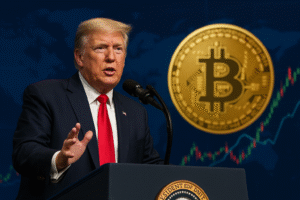Trump’s Pro-Crypto Shift Sends Ripples Through Global Markets
Washington, D.C., August 12, 2025 — The cryptocurrency industry has entered a new chapter under President Donald Trump’s administration, with a series of high-profile policy moves, regulatory shifts, and market reactions reshaping the digital asset landscape.
Landmark Policy Decisions
In January, the White House issued an executive order titled “Strengthening American Leadership in Digital Financial Technology”. The directive scrapped earlier restrictions, confirmed opposition to a U.S. central bank digital currency, and established a federal working group to explore a national crypto reserve.
directive scrapped earlier restrictions, confirmed opposition to a U.S. central bank digital currency, and established a federal working group to explore a national crypto reserve.
The idea of such a reserve gained momentum in March when the administration proposed holding Bitcoin, Ethereum, Solana, Cardano, and XRP in strategic reserves — a move that sparked immediate price rallies in those tokens.
Last week, Trump signed the GENIUS Act, the first comprehensive U.S. framework for stablecoins. The legislation sets standards for reserve backing, independent audits, and anti-money laundering compliance, while complementing other initiatives in “Crypto Week,” including the CLARITY Act.
Retirement Funds Open to Digital Assets
On August 7, the president authorized 401(k) and other retirement plans to invest in cryptocurrencies and private equity. Industry analysts say the decision could channel billions in new capital into the sector, with Bitcoin and Ethereum funds already recording major inflows.
A day later, the administration’s digital asset working group released a 160-page report outlining nearly 100 recommendations for regulating markets, stablecoins, DeFi, and taxation. The report is expected to guide Congress and federal agencies over the next several years.
Market and Investor Response
Bitcoin has surged past $122,000 in recent weeks, while Ethereum is trading above $4,300. Analysts attribute much of this momentum to Trump’s policy signals and the perception of a friendlier regulatory climate.
However, volatility remains. Earlier this year, the administration’s aggressive tariff strategy triggered a sharp sell-off in crypto, with Bitcoin briefly dipping to $76,000 before rebounding.
Controversy and Ethical Questions
While Trump’s policies have been welcomed by many in the industry, critics point to potential conflicts of interest. The rapid listing of the $TRUMP memecoin on major exchanges and the launch of the World Liberty Financial initiative have drawn scrutiny, with watchdog groups warning of possible misuse of presidential influence for personal financial gain.
White House officials have dismissed such allegations, saying all initiatives are aligned with national economic goals.
Outlook
With pro-crypto legislation, institutional participation, and federal engagement at unprecedented levels, the U.S. may be on track to become a global leader in digital assets. Yet, ongoing market volatility and unresolved ethical debates suggest the political and financial story of Trump-era crypto policy is far from over.



